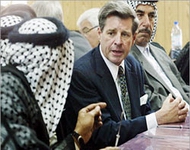Fresh ambush against US troops in Iraq
A US military convoy has come under attack near the Iraqi town of Balad, Reuters reported.
 |
| Iraqis are infuriated by the loss of life during US offensives in over the past week |
The news agency’s correspondent said on Sunday the convoy was ambushed on a highway and a truck was ablaze after apparently being targeted by a rocket-propelled grenade.
The correspondent said US Apache helicopters were flying overhead as they searched for the attackers near the town, 90 kilometres north of Baghdad.
Soldiers were quoting as saying several casualties had been evacuated.
There has been no comment from the US military on the reported ambush.
The attack is the latest in a series of resistance operations against US occupation forces in Iraq.
Washington has admitted that 40 of its soldiers have been killed in the past six weeks but eyewitnesses have reported higher figures.
US troops have launched a massive military operation to capture supporters of ousted Iraqi President Saddam Hussein’s government.
Aljazeera’s correspondent in the area reported around 100 people killed in the campaign, fuelling already bitter feelings among Iraqis towards US occupation troops.
The offensive is focusing on Baghdad and other areas to the north and west of the capital.
Soldiers searched houses in the Sunni Muslim town of Falluja – 70 kilometres west of Baghdad, late on Saturday night.
Attack in Al-Ramadi
News of the ambush coincided with conflicting reports from west Iraq on whether a US military base in the town of al-Ramadi was attacked late on Saturday night.
Aljazeera’s correspondent in al-Ramadi reported hearing ambulances heading towards the compound and helicopters circling overhead.
The compound previously served as the headquarters for the Iraqi Military Intelligence before the fall of Saddam.
But Lieutenant Colonel Hector Mirabile denied reports of a mortar attack saying there had been “absolutely no attack against us.”
He explained that local children were playing with gunpowder from unused shell cases when a fire started.
“Some cases exploded. Nobody was injured,” he said.
Eyewitnesses told Aljazeera that 20 helicopters participated in an assault near Rawa. According to one, “the helicopter gun-ships turned the place into hell.”
‘Blood everywhere’
Aljazeera correspondent Tayseer Alooni who visited the scene of the battle reported seeing scores of dead Iraqis, some with ropes tied around their necks suggesting they had been taken prisoner and executed.
The US military has reported killing 27 Iraqis after clashes broke out late on Thursday when US forces came under a rocket propelled grenade attack near Balad, about 80 kilometres northeast of Baghdad.
But, quoting military officials, The Washington Post reported seven Iraqis had been killed when US troops attacked Iraqis after the Balad ambush.
The Post’s Sunday edition quoted Lieutenant Colonel Andy Fowler saying seven were confirmed dead – the figure of 27 killed was based on “initial estimates,” he said.
The newspaper also cited Iraqi witnesses as saying five of the dead – an elderly shepherd and his relatives – were not involved in the ambush.
Several US soldiers have been killed or wounded in ambushes concentrated in two main areas – to the west of Baghdad, around al-Ramadi and Falluja, and to the north around Balad, Baquba and Tikrit, Hussein’s home town.
Iraqi National Congress leader, Ahmed Chalabi, warned Washington that further attacks would continue until local people are given more power.
Another arrest
The US Central Command in Doha announced on Saturday the capture of Hamid Raja Shalah, the former commander of the Iraqi air force. Shalah was number 17 on the occupation force’s “most wanted” deck of playing cards, issued on 11 April.
 |
| Paul Bremer is holding a series of meetings with Shia leaders |
The whereabouts of Saddam and his two sons, Uday and Qussay, however, remain a mystery.
More than half the 55 Iraqis listed as most wanted have been captured or surrendered to coalition forces since 9 April.
Meanwhile, the administrator of Iraq Paul Bremer, vowed to put a stop to meddling by Iraq’s neighbours.
His pledge came on the same day he started a series of meetings aimed at engaging traditional leaders in the Muslim Shia south.
Without naming countries, Bremer’s comments were largely targeted at Iran, which has a strong influence over Iraq’s majority Shia population.
“We are aware of interference in Iraq by some of its neighbours,” Bremer told an audience of leading tribal sheikhs in Hillah – 100 kilometres south of Baghdad.
“I believe it is not in the interests of the Iraqi people. You can be sure that I take very seriously the authority that the president has given to me to make sure that it stops.”
US officials have stepped up their rhetoric against Iran, even though the predominantly Shia central and southern parts of Iraq have remained largely free of attacks that have targeted US troops in the Sunni regions in the west and north of Baghdad.